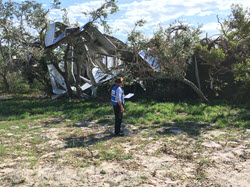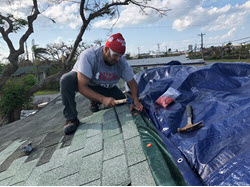A CBP member goes back to the scene of horrific flooding to help a community in need

Office of the Executive Secretariat in
Washington, D.C., surveys Hurricane
Harvey damage in Texas in August 2017
as part of the Surge Capacity Force. Roche
recently returned to Houston as part of a
charity that rebuilds homes and provides
aid for those affected by natural disasters.
Photo courtesy of Joe Roche
In August 2017, Joe Roche went to Houston to help in the recovery from the record rains and floods of Hurricane Harvey. The management and program analyst from U.S. Customs and Border Protection’s headquarters in Washington, D.C., made the trip as part of the Surge Capacity Force – a group of Department of Homeland Security employees who volunteered to go to areas devastated by natural disasters to help in recovery. During his time in eastern Texas, he worked on logistics and did damage assessments for people making claims to the Federal Emergency Management Agency – better known as FEMA – to get aid to rebuild their lives.
“Every day, we were delivering supplies and meeting with people,” he said, adding the force eventually switched to mitigation efforts. “That meant actually going to the homes and doing significant damage estimates for FEMA: what people’s situations were, what help had they gotten, what did they need. In a disaster, everything is at issue: lost cars, lost property, lost touch with other people. It was quite overwhelming.”
Almost two years to the day Hurricane Harvey drenched that part of Texas, Roche returned to Houston, but this time as a different kind of volunteer, a volunteer for the non-profit Team Rubicon. The group of military veterans and first responders rapidly deploys as emergency response teams to provide relief to those hit by disasters, immediately after and sometimes years later.
“It was like seeing the bookends of that disaster,” said Roche, an eight-year, U.S. Army combat veteran of Iraq and Afghanistan. “Two years later, we’re still finding where people still hadn’t been able to get back into their homes, despite help from the federal and state governments. Team Rubicon is now targeting low-income families in the hardest hit areas.”
The group is rebuilding the flooded houses for free, sometimes from the ground up. Roche said when you see people finally able to get back in their homes, it really tugs at the heartstrings.
“It’s really quite an amazing thing to see that experience,” he said. “For them, the nightmare of two years is over.”
And the reward is not just for those hit by natural disasters.
“Some people might think of it as draining,” Roche said. “But there is something very rewarding about being able to give back to these communities.”
Roche said volunteering for the charity gives many veterans, such as himself, a chance to reconnect with the training and the people from military service.
“We all have this training from when we were in the service; do we just put that in a closet? I’m getting a chance to use it again,” he said. “It’s also nice to get together with combat vets (a large portion of the group). It’s like I’m back with those I served with in Baghdad and Kandahar. There’s a good feeling to that.”

Roche was back on the road with Team Rubicon in October – this time headed for the Bahamas to help people devastated by Hurricane Dorian. In the two weeks he was in the islands, he saw nearly unimaginable destruction as he served as a strike team leader for the group, working in the most Spartan of conditions.
“Many of us slept outside, as did I the whole time, though partially under a roof, yet I got rained on almost every night and day,” he said. “Clothes hand-washed, never dried, bugs galore, heavy rains. You name it; it all happened.”
The work in the Bahamas included supporting local communities and assisting survivors to begin the process of recovery, and partnering with local officials to assist aid distribution, and help restore schools, churches, hospitals and community centers.
Roche said sometimes while team members took a lunch break of military rations, they tried to process all they witnessed: odors of dead carcasses and rotting debris, and constantly trying to comfort people who have gone through a hell on earth.
“It’s a bit much,” he said. “Everything is wet, we stink like crap, but we are all volunteers. Could be anywhere else. But this is the call we answered.”
He credits his coworkers back in Washington, D.C., for helping pick up the slack in the office while he’s away, and he hopes he can continue to help others who lose so much. Just before leaving for the Bahamas, while he packed up his personal gear, as well as another suitcase full of relief supplies he handed out to locals, Roche said he tries not to overthink what could be waiting for him, as he knows they’ll be living in pretty rough conditions. He just wants to face the challenges as they come.
“I’ve gone to a few of these just to know that every time you’ve got it figured from the last time, it’s best not to anticipate, but just to arrive and do what you can,” Roche said. “We know that we’re dealing with people on the worst days of their lives; they have no hope, there’s complete devastation. Hopefully, we can turn that around and make it a good day for them as they see help is actually there.”


